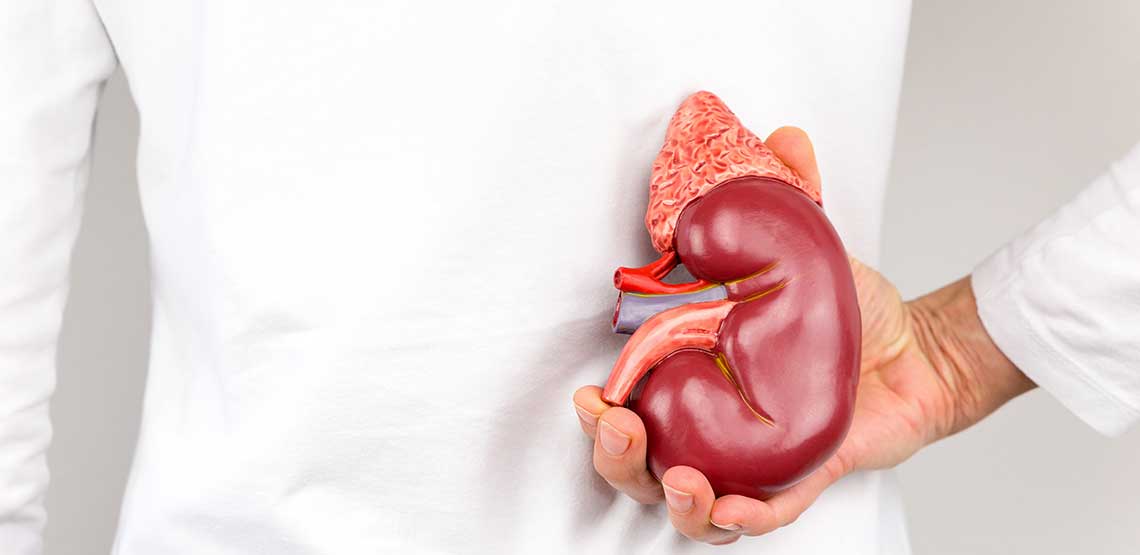Causes of Kidney Cancer
Kidney cancer starts in one or both kidneys. The kidneys have a few essential functions in the body. They remove waste from the body, and salt, water and waste products from the blood. The kidneys also help maintain proper blood pressure and make erythropoietin, which is a hormone that helps the bone marrow make red blood cells.
According to the National Kidney Foundation, kidney cancer most often starts in the tubes of the kidneys called the renal tubules. Kidney cancer is not one of the most common types of cancer. According to the American Cancer Society, about 73,700 people will be diagnosed with kidney cancer this year in the United States. Additionally, more men are diagnosed than women.
The disease also tends to affect older adults. Most people that are diagnosed with the disease are over the age of 65. It is very uncommon in people younger than 45.
Regarding the technicalities of what causes kidney cancer, researchers understand that kidney cancer starts when some cells in the kidneys develop mutations. The mutation in the DNA sends a message to the cells to divide quickly. This rapid division leads to the development of a tumor. The cells can also break off and travel to other areas of the body, leading to metastasized cancer. What researchers do not know is exactly why some people develop these cell mutations.
Kidney Cancer Symptoms
Kidney cancer may not cause any symptoms in the early stages. There are also no routine screening tests to check for kidney cancer. Because there is no screening and symptoms are often not present in the early stages, kidney cancer is often diagnosed in an advanced stage.
Once the tumor has grown, it may lead to symptoms. Common symptoms of kidney cancer include:
- Blood in the urine
- A lump in the area near the kidneys
- Night sweats
- Fever, which may come and go
- Pain in the flank (mid-back) that does not go away
- Loss of appetite
- Unintentional weight loss
- Fatigue
Kidney Cancer Diagnosis
Kidney cancer is diagnosed through imaging tests, such as a CT scan, and by taking a small sample of tissue from the kidney for a biopsy. Once kidney cancer is diagnosed, it is staged.
Staging allows the doctor to know how advanced the cancer is, which helps determine the best treatment options. Kidney cancer stages are as follows:
- Stage I: stage one kidney cancer stage involves a tumor that is only in the kidneys and usually smaller than seven centimeters.
- Stage II: at stage two kidney cancer, the tumor is still only in the kidneys, but it is bigger than in stage I.
- Stage III: in stage three kidney cancer, the mass extends beyond the kidney and may be in nearby lymph nodes.
- Stage IV: stage four kidney cancer is the most advanced stage of kidney cancer. It involves cancer cells that have spread past the kidneys and may be in distant organs of the body, such as the lungs or bones.
Kidney Cancer Risk Factors and Lowering Your Risk
There are several factors that increase a person’s risk of developing kidney cancer. Some of the risk factors are preventable, and some are uncontrollable. Risk factors, which can contribute to what causes kidney cancer, include:
Gender: men develop kidney cancer more often than women.
Race: black people develop kidney cancer more frequently than white people.
Family history: having a brother or sister with kidney cancer increases a person’s risk of developing the disease.
Having a rare genetic disease: certain genetic diseases, such as Birt Hogge Dube syndrome, are linked to an increased chance of developing kidney cancer.
Having long-term dialysis treatment: People with advanced kidney disease often require dialysis to do the work of the kidneys. Having long-term dialysis increases a person’s risk for kidney cancer.
Although the risk factors above may be out of your control, there are some additional risks that are controllable, including those listed below.
Smoking: people that smoke have a higher chance of developing many types of cancer, including kidney cancer.
Being overweight: obesity is thought to slightly increase the risk of developing kidney cancer. Maintaining a healthy weight is one way to lower your risk.
High blood pressure: having high blood pressure may lead to kidney disease, which is linked to a higher risk of developing kidney cancer. Taking steps to maintain a healthy blood pressure may reduce your risk of kidney disease, and subsequently, cancer.
Since some of the factors that increase the chance of developing kidney cancer are uncontrollable, it makes sense to control the factors you can. Making healthy lifestyle choices, such as not smoking, getting to a healthy weight and managing high blood pressure, can help someone decrease their risk for kidney cancer.
Kidney Cancer Treatment
The treatment of kidney cancer depends on the stage of the disease. Often, a combination of the treatments below may be used. Kidney cancer treatment includes:
Surgery: surgery is often recommended to remove the tumor in the kidneys. It may be the first step in treatment.
Chemotherapy: chemotherapy is used to kill any remaining cancer cells after surgery, or it may be used before surgery to shrink the tumor.
Immunotherapy: immunotherapy involves drugs that boost the immune system to help it attack the tumor.
Targeted therapy: targeted therapy involves administering drugs that block the growth of blood vessels that feed the tumor. Other targeted therapies destroy certain proteins in the cancer cells and prevent them from multiplying.
